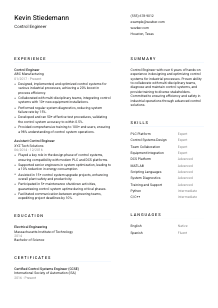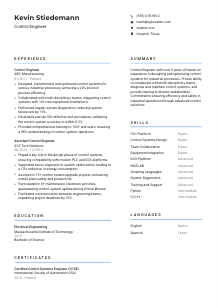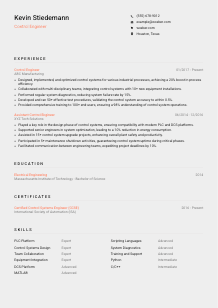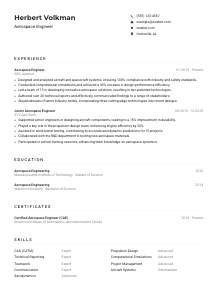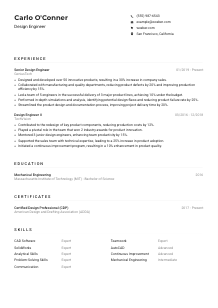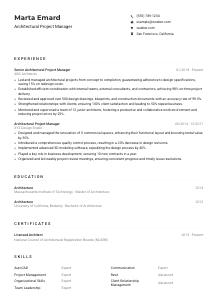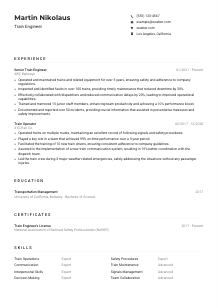Control Engineer CV Example
Crafting automation, but your CV feels manual? Unravel this Control Engineer CV example, synthesized using Wozber free CV builder. Discover how to blueprint your system savvy to sync with job requisites, keeping your control career cruising on autopilot!

How to write a Control Engineer CV?
Embarking on the Control Engineer path? Crafting a CV that stands out is not just about listing your experiences; it's about mirroring the heartbeat of the job description you're targeting. With the precision of a well-designed control system, let's leverage the power of the Wozber free CV builder to craft a CV that not only speaks the language of ATS but also showcases your unique engineering prowess.
Ready to channel your professional journey into a compelling CV narrative? Fasten your seat belts, future Control Engineer, and let's engineer a CV that launches your career to new heights.
Personal Details
Think of the Personal Details section as the control panel of your CV - every input must be precise and strategic. Here's how to customize this section specifically for the Control Engineer position, ensuring your first impression is both polished and compelling.
1. Brand Yourself with Your Name
Your name is the headline of your professional story. Choose a clear, professional font, and set your name a notch above the rest of your text. This isn't just about aesthetics; it's about making your mark as a Control Engineer right off the bat.
2. Specify Your Title
Directly beneath your name, align with the target position by listing "Control Engineer" as your professional title. This immediately positions you as a fit for the role and sets a focused trajectory for the rest of your CV.
3. Ace Your Contact Information
Here, precision is key. Include your most reliable phone number and a professional email address (think firstname.lastname@gmail.com). This ensures that potential employers can effortlessly reach out, making your CV ATS-compliant and user-friendly.
4. Highlight Your Locale
For a job requiring a specific location, like our Houston, Texas-based role, emphasizing your local address or your willingness to relocate bridges the gap between you and the job requirements. It's a simple yet effective nod to your readiness and commitment.
5. Professional Profiles: To Add or Not to Add?
Considering adding a LinkedIn profile? Make sure it reflects your CV. This consistency paints a professional and updated picture of you, extending your personal brand beyond the CV.
Takeaway
Just like a well-calibrated sensor in a control system, the Personal Details section needs to provide accurate and relevant information. Make every detail count to ensure your professional introduction sets the stage for the impactful narrative that follows.





Experience
In the world of Control Engineering, nothing speaks louder than hands-on experience. Let's zero in on how to vividly paint your professional journey, ensuring each experience highlights your suitability for the Control Engineer role.
- Designed, implemented, and optimised control systems for various industrial processes, achieving a 20% boost in process efficiency.
- Collaborated with multi‑disciplinary teams, integrating control systems with 10+ new equipment installations.
- Performed regular system diagnostics, reducing system failure rate by 15%.
- Developed and ran 50+ effective test procedures, validating the control system accuracy to within 0.5%.
- Provided comprehensive training to 100+ end‑users, ensuring a 98% understanding of control system operations.
- Played a key role in the design phase of control systems, ensuring compatibility with modern PLC and DCS platforms.
- Supported senior engineers in system optimisation, leading to a 10% reduction in energy consumption.
- Assisted in 15+ control system upgrade projects, enhancing overall plant safety and productivity.
- Participated in 5+ maintenance shutdown activities, guaranteeing control system uptime during critical phases.
- Facilitated communication between engineering teams, expediting project deadlines by 10%.
1. Deep Dive into the Job Requirements
Before tailoring this section, thoroughly dissect the job description. Identify the core responsibilities and required skills. This deep understanding will serve as your guide to crafting experience entries that resonate with the role's needs.
2. Chronology and Clarity
Organize your experience in a reverse-chronological order, spotlighting your most recent achievements. For each role, include your job title, the company's name, and your tenure, painting a clear timeline of your professional ascent.
3. Mirror Your Achievements
Link your responsibilities and successes directly to the job description. Phrases like 'designed and optimised control systems, achieving a 20% boost in efficiency,' echo the role's needs and demonstrate your direct impact.
4. Quantify Your Impact
Numbers command attention. Quantifying achievements, such as 'reduced system failure rate by 15%' or 'trained 100+ end-users,' gives tangible weight to your accomplishments, showcasing your value in a language that hiring managers understand.
5. Relevance is Key
While your journey might be diverse, focus on the experiences directly tied to the Control Engineer role. This isn't the place to share unrelated achievements. Every bullet point should be a beacon signaling your fit for the role.
Takeaway
Consider your experience section as the control system's core, where each entry must be precisely calibrated to match the role's requirements. Tailor, quantify, and highlight your engineering milestones. Your career landscape is rich; make sure it aligns with the trajectory towards becoming a Control Engineer.
Education
In the meticulously detailed world of Control Engineering, your education not only shows your foundational knowledge but also your dedication to the profession. Let's navigate how to refine this section to underscore your academic credentials.
1. Pin the Degree to the Role
Start by ensuring your highest education level directly matches the job's requirements. For our Control Engineer position requiring a 'Bachelor's degree in Electrical, Mechanical, or Chemical Engineering,' align your education accordingly.
2. Structure and Simplicity
Maintain a straightforward structure listing your degree, field of study, educational institution, and graduation year. This clarity makes it easy for the ATS and hiring managers to verify your qualifications quickly.
3. Showcase the Perfect Fit
If your degree directly aligns with the job, such as a 'Bachelor of Science in Electrical Engineering,' highlight this prominently. It's a clear signal to the employer of your groundwork in the field and your direct applicability to the role.
4. Highlight Relevant Extras
Particularly at the inception of your career, relevant coursework, thesis work, or projects that mirror the job's focus can be valuable additions. They provide depth to your academic profile, showcasing a proactive and focused approach towards your Control Engineering career.
5. Beyond the Degree
Extracurricular activities, honors, or memberships in relevant societies (like ISA) can further accentuate your commitment and insertion in the field. While they may hold less weight for senior roles, they're golden for early-career professionals.
Takeaway
Your education section should serve as a testament to your preparation and fit for the Control Engineer role. Craft it with the same precision and attention to detail you would apply to a complex control system design. This foundation sets a strong academic stage for your professional narrative.
Certificates
In the fast-evolving field of Control Engineering, certifications are like updated software—ensuring your skills are current. Let's explore how to spotlight certifications that add depth to your expertise.
1. Scan the Horizon for Relevant Certifications
Start by identifying certifications that amplify your suitability for the Control Engineer role. A certification like 'Certified Control Systems Engineer (CCSE)' directly echoes the job's technical requirements and illustrations your continued professional development.
2. Quality over Quantity
Rather than listing every certification, focus on those most relevant to Control Engineering. This strategic selection ensures that your CV remains focused and showcases only the most impactful credentials.
3. Date and Detail
Include the acquisition or expiration dates for time-sensitive certifications. This detail underscores your dedication to maintaining contemporary skills in a rapidly advancing field.
4. Continual Learning
The tech landscape never stops evolving, and neither should you. Regularly update your certifications and pursue new ones that align with your career trajectory and the innovations within Control Engineering.
Takeaway
View certifications as key components in your Control Engineering toolkit, evidencing your commitment to continual growth and skill upgrading. Highlight them well, and they'll reinforce your candidacy, showing you're not just suitable for the role but are also a forward-thinking and evolving professional.
Skills
In the detailed landscape of Control Engineering, your skills section is a condensed portfolio of your professional capabilities. Let's tailor this section to precisely match the Control Engineer job requirements, showcasing your unique set of tools.
1. Extract and Match
Begin by dissecting the job description to identify both explicit and implicit skill requirements. List your skills that match, such as 'PLC Platform Expertise' and ‘Control Systems Design,' directly relating to those cited in the job requirements.
2. Focus and Filter
Refine your skills list to the most critical and relevant for the role. This focus helps avoid clutter and ensures the hiring manager's attention is drawn to your most applicable and impressive skills.
3. Organize and Present
Arrange your skills in a logical order, starting with those most critical for the role. A clear, structured skills section speaks volumes about your organisational capabilities and makes it easier for hiring managers (and the ATS) to spot your compatibilities.
Takeaway
Consider your skills section as the detailed specifications of a control system—you want every component to serve a purpose and highlight the system's efficiency. Craft this section with care, ensuring it reflects your professional essence and positions you as the ideal candidate for the Control Engineer role.
Languages
The ability to navigate multiple languages in today's interconnected world can significantly enhance your professional value. Here's how to effectively showcase your linguistic skills, making them a compelling part of your Control Engineer CV.
1. Match the Job's Language Requirements
For roles specifying language proficiency, like 'must be highly proficient in English' for our Control Engineer position, prioritize listing those languages at the top of your section, showcasing your capability right from the start.
2. Showcase Your Linguistic Range
Beyond meeting the basic requirements, present your other languages to underscore your adaptability and potential for broader communication. This might be particularly appealing for companies with a global presence or diverse teams.
3. Clarity in Proficiency
Be explicit about your language proficiency levels. From 'Native' to 'Basic,' providing clear indications of your fluency ensures there's no ambiguity about your communication capabilities.
4. Align with the Role's Scope
Consider the broader context of the Control Engineer role. For positions that may involve international projects or multicultural team collaborations, adeptly highlighting your language proficiencies can set you apart as a versatile and globally-oriented candidate.
5. Honesty in Representation
While listing languages can be a strong asset, ensure you're honest about your proficiency. Misrepresentation can lead to challenges down the line, particularly in roles where clear communication is paramount.
Takeaway
Your language skills are not merely personal accomplishments; they're professional tools that can open doors to global projects and collaborations. Flaunt them with pride and precision, highlighting your readiness to engage in the diverse and global field of Control Engineering.
Summary
The summary section of your Control Engineer CV is your moment to shine, succinctly conveying your professional identity and readiness for the role. Here's how to craft a summary that captivates and compels.
1. Frame Your Professional Identity
Start with a strong opening line that encapsulates your professional stature and experience. For instance, 'Control Engineer with over 6 years of hands-on experience in designing and otimizing control systems for industrial processes' sets a solid foundation.
2. Highlight Your Relevant Qualifications
Directly address key requirements from the job description. Citing your skills and achievements that match, like 'proficient in MATLAB, Python,' or 'achieved a 20% boost in process efficiency,' links your capabilities with the employer's needs.
3. Be Precise and Powerful
Your summary is not the place for meandering descriptions. Keep it sharp, concise, and impactful, with a focus on your qualifications for the Control Engineer role. Each word should add value to your candidacy.
4. Tailor Your Summary to the Role
Customize your summary for each application, ensuring it reflects the nuances of the job at hand. This tailored approach demonstrates your attention to detail and your genuine interest in the position.
Takeaway
Think of your summary as the introduction to your professional symphony—a concise yet powerful section that sets the tone for the rest of your CV. By aligning it closely with the job requirements, you immediately establish yourself as a strong candidate for the Control Engineer position. Let it be the hook that piques the interest of hiring managers, compelling them to delve deeper into your CV.
Launching Your Control Engineer Journey
Congratulations on fine-tuning your CV into a powerful testament to your expertise and readiness for the Control Engineer role. You've navigated through each section with the precision of a seasoned engineer, ensuring your CV not only meets but surpasses the requirements. Now, equipped with a bespoke, ATS-friendly CV, you're set to embark on exciting new professional adventures.
The world of Control Engineering awaits your unique contributions. Craft your CV with Wozber, and let your career as a Control Engineer take flight.

- Bachelor's degree in Electrical, Mechanical, or Chemical Engineering.
- Minimum of 3 years of experience in control system design, implementation, and commissioning.
- Proficiency in programming and scripting languages such as MATLAB, Python, or C/C++.
- Strong knowledge of various control systems and their application, including PLC and DCS platforms.
- Effective communication and interpersonal skills to collaborate with multi-disciplinary teams.
- Must be highly proficient in English.
- Must be located in or willing to relocate to Houston, Texas.
- Design, implement, and optimize control systems for various industrial processes, ensuring efficiency and safety.
- Collaborate with cross-functional teams to integrate control systems with new or existing equipment.
- Perform regular system diagnostics, maintenance, and troubleshooting to ensure control reliability and accuracy.
- Develop and execute test procedures to verify the effectiveness of the control systems.
- Provide training and technical support to end-users, ensuring their understanding of control system operations.





